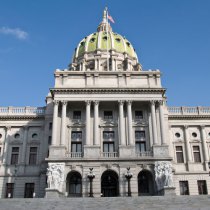Pa. General Assembly Set to Return to Harrisburg
Events in the Pennsylvania capital this summer have mostly consisted of a few public policy hearings, gubernatorial press conferences, and a handful of rallies. But one bill in particular was proposed that deserves our members’ attention: it focuses on property tax.
By Peter N. Calcara, vice president – government relations
A tranquil summer in Harrisburg is about to expire with the return of Pennsylvania legislators to the General Assembly. State House members return on Sept. 17, while members of the Senate come back a week later on Sept. 23.
 The summer recess has been atypical when compared to the last few. Most lawmakers were all too happy to spend time in their districts. July and August events in the capital have mostly consisted of a few public policy hearings, gubernatorial press conferences, a handful of rallies in support of or opposition to several issues, and a smattering of new bill introductions. One bill in particular deserves our members’ attention.
The summer recess has been atypical when compared to the last few. Most lawmakers were all too happy to spend time in their districts. July and August events in the capital have mostly consisted of a few public policy hearings, gubernatorial press conferences, a handful of rallies in support of or opposition to several issues, and a smattering of new bill introductions. One bill in particular deserves our members’ attention.
This summer Rep. Frank Ryan (R-Lebanon) introduced a school property tax elimination plan—House Bill 13.
“There is no bigger issue in the Commonwealth of Pennsylvania than school property taxes,” Ryan, a PICPA member, said. “I get more emails and more comments on ‘When are we going to do something about school taxes’ than any other issue.”
Ryan’s legislation would replace school property taxes with some expanded and new levies so that everyone in Pennsylvania helps to fund Pennsylvania’s education system. A local personal income tax (PIT) of 1.85% would be paid directly to the school district and a local sales tax of 2% would be added to existing items that are already taxed by the sales and use tax (SUT). These taxes would be allocated to the school district in the county where the sale took place.
The local sales tax of 2% only would be added to food and clothing, but these items would not be subject to the current 6% SUT. Anyone receiving Supplemental Nutrition Assistance Program benefits or public assistance will be exempt from taxes on food. Social Security would not be taxed. Retirement income would be taxed at a rate of 4.92%, with 3.07% of that tax going to the state for education and 1.85% of the tax going to the school district. It is estimated that seniors would save about 75% on what they currently pay through school property taxes.
House Bill 13 will be referred to a House committee for study. PICPA’s State Taxation Committee has a working group reviewing the legislation.
On the political front, there was a special election to fill a state House seat for Union and Snyder counties. David Rowe (R-Union) won a special election on Aug. 20 to fill a vacancy in the 85th state House district. Rowe is expected to be sworn in when the House returns to session, and Republicans will hold a 110-93 majority.
The PICPA government relations team has spent the summer working with key lawmakers, staff, and the Department of Revenue on two legislative holdovers from the spring. House Bills 17 and 926 are pending before the full House and House Finance Committee, respectively. (For more on these two bills, please read “Advocacy Never Rests: PICPA Works Behind the Scenes in Quiet Harrisburg.”)
As we gear up for the fall legislative session, we encourage members to stay informed about the issues under consideration by the General Assembly. One way to monitor activity in Harrisburg is to subscribe to PICPA’s Legislative Update email.
We also want to hear from you. Whether it’s a piece of legislation that is of interest to you, your firm, or your business, or a problem with the state Department of Revenue, the PICPA government relations team is here to help you navigate the rapids of state government. Contact us at governmentrelations@picpa.org.
Sign up for weekly professional and technical updates in PICPA's blogs, podcasts, and discussion board topics by completing the form here.
PICPA Staff Contributors
Disclaimer
Statements of fact and opinion are the authors’ responsibility alone and do not imply an opinion on the part of PICPA officers or members. The information contained in herein does not constitute accounting, legal, or professional advice. For professional advice, please engage or consult a qualified professional.






